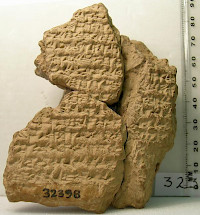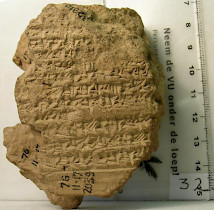BCHP 7 (Antiochus, Bactria, and India Chronicle)
The Babylonian Chronicle concerning Antiochus, Bactria, and India ("Antiochus and India chronicle"; BCHP 7 or ABC 13A) is a chronicle written in ancient Babylonia in the Hellenistic Period. It mentions a Seleucid crown prince, probably the future king Antiochus I Soter, ordering repairs in Babylon and preparing for war.

The Babylonian Chronicle concerning Antiochus, Bactria, and India ("Antiochus and India chronicle"; BCHP 7 or ABC 13A) is one of the Mesopotamian chronicles written in ancient Babylonia in the Hellenistic Period. It mentions a Seleucid crown prince, probably the future king Antiochus I Soter, ordering repairs in Babylon and preparing for war. The cuneiform tablets (BM 32310 [76-11-17, 2039] + 32398 [S† 76-11-17,2131] + 32384) are in the British Museum.
On this webpage, a new reading is proposed; the official publication will be in I.L. Finkel, R.J. van der Spek, R. Pirngruber, Babylonian Chronographic Texts from the Hellenistic Period (2020; = BCHP; Writings of the Ancient World).
Description of the tablet
The tablet has lost too many pieces, so that every reconstruction must remain provisional. The fragments as preserved constitute the upper right part of the original tablet. Not much seems to be lost from the right part, but a considerable part, possibly two thirds, of the left part is lost. The textual remnants of the obverse measure 8 cm. height 6 cm. width. The right edge is 2.2 cm. thick, the left part 4 cm, the upper edge 2.5 cm., the lower part 4 cm.
The edition of Grayson, ABC 13A, is based on BM 32310 only. Irving Finkel has now joined the other fragments.
The tablet has the same crude handwriting as the other tablets concerning the Crown Prince (i.e., the Antiochus and Sin and Juniper Garden Chronicles).
Previous editions
ABC 13A; CM no. 36, p. 213-4; D.A. Kennedy copied BM 32398 as CT 49, 188.
Date

The date of the tablet is difficult to recover, but there are some clues. A king Seleucus is mentioned, and a certain Antiochus. That makes the time of Antiochus, the Crown Prince, a suitable option. In addition, the crude hand writing of the scribe is very similar to the other tablets dating to Antiochus, the Crown Prince. Finally, the word "Greek" is written lúE-man-/na-a-a\ (rev. 5’), an idiosyncratic spelling, which also occurs in other documents of this period. Hence, it is likely that this tablet dates to the period.
General Remarks
Though details are not clear, the document seems to record repair work on the Esagila, which was indeed a concern of Antiochus I (cf. Antiochus and Sin chronicle [BCHP 5] and Ruin of Esagila chronicle [BCHP 6]). The fact that Seleucus is in Syria and that Bactria and India are mentioned as well, make it sure that the tablet postdates Seleucus' return from India ca. 302 BCE. We know that Antiochus took part in the Battle of Ipsus in 301. The chronicle may relate these events, but it is not at all certain. Another option would be the battle of Corupedium (281 BCE), but Antiochus was not present there. He ruled the Eastern satrapies on behalf of his father.
Finally, the First Syrian War comes to mind (ca. 274 BCE). In that period Antiochus was king, and the Astronomical Diaries report that Antiochus went from Sardes to Ebir Nari in order to fight against the troops of Egypt. On 24 Addaru 38 SE (26 March 273)
the satrap of Babylonia brought out much silver, cloth, goods, and utensils from Babylon and Seleucia, the royal city, and twenty elephants, which the satrap of Bactria had sent to the king, to Ebir Nari, to (ana muhhi) the king".note
If we have to date our chronicle in this period, we must assume that ...]Si LUGAL in obv.13’ is not Seleucus, so that the si must be the end of some Akkadian word, or the end of a name. Royal names ending in si, relevant for this period, are difficult to find. In the Diadochi Chronicle Pi-líp-i-si (obv. 26=7’) and Pi-il-i-si (obv. 33=14’) are preserved for Philip III Arridaeus.
Antiochus and Seleucus are never spelled with -si. If a Ptolemy was intended, we should expect "king of Egypt", rather than "king". In no Akkadian text the name Ptolemy is completely preserved. The fact remains that the chronicle's script is similar to the other documents that belong to the period of Antiochus as crown prince.
Obverse
[Obv.1'] .....
[Obv.2'] ..... .. .. .. ] aforementioned [ .. .. .. .. .. .. .. .....]
[Obv.3'] ..... the .. ]s of Esag[ila.. .. .. .. .. .. .....]
[Obv.4'] ..... .. ] which/of the satrap of Akkad [ .. .. .. .. .. .. .....]
[Obv.5'] ..... the son? of the ki]ng immediately in order to inspect [.. .. .. .. .. .. .....]
[Obv.6'] ..... .. ] of Ezida in the rep[air work of?.. ..] x x [ .. .....]
[Obv.7'] ..... .. ] ..... of/which the Ur[uk]aean to/against [ .....]
[Obv.8'] ..... the satrap of] Akkad the order of the ki[ng to ] the Babylonians [ .....]
[Obv.9'] ..... .. .. .. .. ..]s the making of x[ .. .. ..] at the requ[est of the (son of the) king]
[Obv.10'] ..... .. .. .. .. ] .. .. .. x [.. That month,] day 20th, [.....]
[Obv.11'] ..... .. .. ] .. .. , for the making of a wooden? ca[binet .....]
[Obv.12'] ..... the ...]s, who are in Babylon, to a certain Han[aea]n x x [.....]
[Obv.13'] ..... ] Se(leucus), the king, in Transeuphratene with [ .. ..] x x [.....]
[Obv.14'] ..... elephants? from] Bactria and Ind [ia?.. ..] x [.....]note
[Obv.15'] .... ] .. killed (or: defeated) and he is destroying x[.. .. ..]
[Obv.16'] [Blank]
Reverse
[Rev.1'] .....
[Rev.2'] ..... ] aforementioned [ ..... ]
[Rev.3'] ..... ] an offering in the [Greek] fashion
[Rev.4'] ..... ] of? the king the troop[s .....]
[Rev.5'] ..... ] the Greek [.. .. ..] x
[Rev.6'] ..... ] afterwards the king se[nt] [ ... ] to the camp [.....]
[Rev.7'] ..... the ...]s returned. Day 23th. Gold x [ ..... ]
[Rev.8'] ..... ] x x x .. .. in its place in the Juniper garden [ ..... ]
[Rev.9'] ..... ] x he took. [blank]
[Rev.10'] Month .. (the troops of) PN wi]th? the troops of Antio[chus]
[Rev.11'] did battle …..] x-lagim his troops […..]
[Rev.12'] ..... ] they established, by the sword [they (were)] k[illed (or: defeated) .....]
------------------------------------------
[Rev.13'] [Blank]